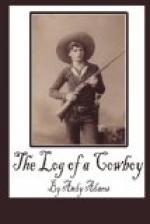The second guard, under Flood, pushed the cattle off their beds an hour before dawn, and before they were relieved had urged the herd more than five miles on the third day’s drive over this waterless mesa. In spite of our economy of water, after breakfast on this third morning there was scarcely enough left to fill the canteens for the day. In view of this, we could promise ourselves no midday meal—except a can of tomatoes to the man; so the wagon was ordered to drive through to the expected water ahead, while the saddle horses were held available as on the day before for frequent changing of mounts. The day turned out to be one of torrid heat, and before the middle of the forenoon, the cattle lolled their tongues in despair, while their sullen lowing surged through from rear to lead and back again in piteous yet ominous appeal. The only relief we could offer was to travel them slowly, as they spurned every opportunity offered them either to graze or to lie down.
It was nearly noon when we reached the last divide, and sighted the scattering timber of the expected watercourse. The enforced order of the day before—to hold the herd in a walk and prevent exertion and heating—now required four men in the lead, while the rear followed over a mile behind, dogged and sullen. Near the middle of the afternoon, McCann returned on one of his mules with the word that it was a question if there was water enough to water even the horse stock. The preceding outfit, so he reported, had dug a shallow well in the bed of the creek, from which he had filled his kegs, but the stock water was a mere loblolly. On receipt of this news, we changed mounts for the fifth time that day; and Flood, taking Forrest, the cook, and the horse wrangler, pushed on ahead with the remuda to the waterless stream.
The outlook was anything but encouraging. Flood and Forrest scouted the creek up and down for ten miles in a fruitless search for water. The outfit held the herd back until the twilight of evening, when Flood returned and confirmed McCann’s report. It was twenty miles yet to the next water ahead, and if the horse stock could only be watered thoroughly, Flood was determined to make the attempt to nurse the herd through to water. McCann was digging an extra well, and he expressed the belief that by hollowing out a number of holes, enough water could be secured for the saddle stock. Honeyman had corralled the horses and was letting only a few go to the water at a time, while the night horses were being thoroughly watered as fast as the water rose in the well.
Holding the herd this third night required all hands. Only a few men at a time were allowed to go into camp and eat, for the herd refused even to lie down. What few cattle attempted to rest were prevented by the more restless ones. By spells they would mill, until riders were sent through the herd at a break-neck pace to break up the groups. During these milling efforts of the herd, we drifted over a mile from camp; but by the light of moon and stars and the number of riders, scattering was prevented. As the horses were loose for the night, we could not start them on the trail until daybreak gave us a change of mounts, so we lost the early start of the morning before.




